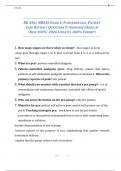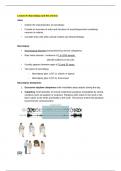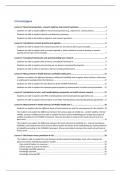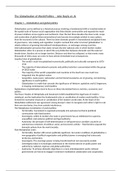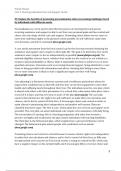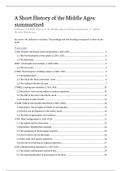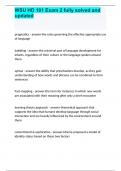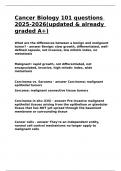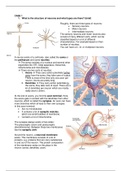NR 226
NR 226/ NR226 EXAM 2: FUNDAMENTALS: PATIENT
CARE REVIEW | QUESTIONS & ANSWERS| GRADE A|
(NEW 2025/ 2026 U PDATE) 100% CORRECT
1. How many stages are there when we sleep?: -four stages of nrem
-sleep goes through stages 1 to 4, then reversal from 4 to 3 to 2, followed by
rem
2. What is a pca?: patient controlled analgesia
3. Patient-controlled analgesia (pca): drug delivery system that allows
patients to self-administer analgesic medications on demand 4. Who is the
primary reporter of pain?: the patient
5. What should you monitor with a patient that has a pca pump?: -s/s of
oversedation and respiratory depression -potential side effects of opioid
analgesics
6. Who can press the button on the pca pump?: only the patient
7. Objective for pca: patient will achieve pain control with proper use of the
pca 8. Teaching strategies pca: -teach how to use the pca before
procedures so that patient understands how to use it after awakening from
anesthesia or sedation.
Include demonstration of use of pump
-instruct patient in the purpose of pca, emphasizing that patient controls
medication delivery
-explain that the pump reduces risk of overdose
NR 226 1/9
, 2
NR 226
-reinforce instruction as needed with teach-back
9. Evaluation of pca: use the principles of teach back to evaluate
patient/family caregiver learning;
-please describe why you are using the pca
device -when are you planning on pushing the
button?
10. Who is legally & ethically responsible for assessing & managing
pain?: the nurse
11. Stages of grief: denial, anger, bargaining, depression, acceptance 12.
Denial: the person cannot accept the fact of the loss it is a form of
psychological protection from a loss that the person cannot yet bear 13.
Anger: the person expresses resistance or intense anger at god, other people,
or the situation
14. Bargaining: the person cushions and postpones awareness of the loss by
trying to prevent it from happening
15. Depression: the person realizes the full impact of the loss
16. Acceptance: the person incorporates the loss into life
17. If the ph is 7.35-7.45: then the abg result is fully compensated
18. If the ph is below 7.35: it is always acidosis
19. If the ph is above 7.45: it is always alkalosis 20. Co2: = respiratory
normal range= 35-45
21. Hco3: = metabolic normal range= 22-26
22. Hypotonic fluid: -of two fluids, the one
with the lower solute concentration
-a fluid more dilute than blood (1/2 ns, ¼ ns)
NR 226 2/9

